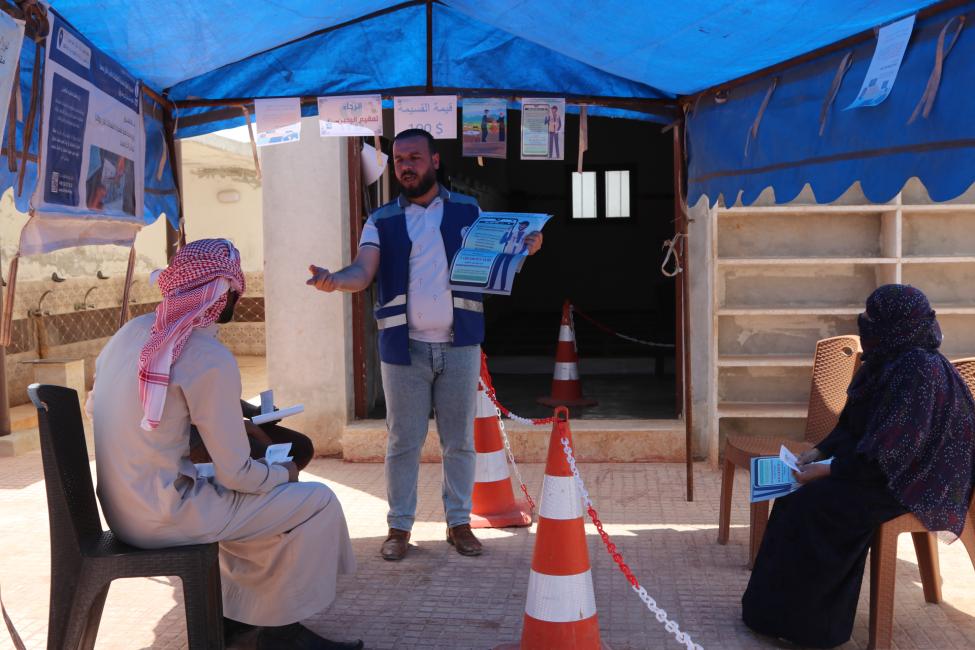-
Who We Are
WHO WE AREThe International Organization for Migration (IOM) is part of the United Nations System as the leading inter-governmental organization promoting humane and orderly migration for the benefit of all. IOM has had a presence in Türkiye since 1991.
About
About
IOM Global
IOM Global
-
Our Work
Our WorkAs the leading inter-governmental organization promoting since 1951 humane and orderly migration, IOM plays a key role to support the achievement of the 2030 Agenda through different areas of intervention that connect both humanitarian assistance and sustainable development. Across Türkiye, IOM addresses the full scope of migration issues, supporting and developing government capacity to manage migration.
Cross-cutting (Global)
Cross-cutting (Global)
- Data and Resources
- Take Action
- 2030 Agenda
In the dusty streets of Idleb, Northwest Syria, Ayesh Yousf is walking home with two heavy bags of flour. Despite the hardships facing 13 years of war, there is a glimmer of hope in his eyes. These bags are his first purchase after receiving his May round of multipurpose cash assistance, the sixth one since January this year.
Since the early hours of the morning, the local mosque has been a hub of activity, with household members from all corners of the camp gathering to receive their cash assistance. The community often congregates here to seek aid and support each other in solidarity.
With an identification document in one hand and eligibility paper in the other, community members – many who have been displaced multiple times by the war – patiently wait for their turn. Each paper is soon to be stamped in exchange for USD 100, representing a critical lifeline for families to buy essential items.
“This assistance helps cover some of our basic needs, such as bread and other staple foods,” says Ayesh Yousf. “It gives us crucial support during this difficult time, enabling us to survive – especially as we are living in tents.”
For internally displaced families in Northwest Syria, multipurpose cash assistance empowers them with the flexibility and choice to buy what they need most. This autonomy, central to the International Organization for Migration (IOM)’s cash-based interventions, aims to restore people's dignity while fostering a sense of normalcy and control over their lives, which have long been ravaged by instability.
“This programme is part of IOM’s inclusive approach to recovery for displaced populations in Northwest Syria. Since the beginning of 2024, with the support of the European Union, we have reached 1,345 households with cash assistance,” says Ali Elberri, IOM Senior Project Associate. “Collaboration with humanitarian organizations on the ground is also critical, as it allows us to gain in-depth knowledge of specific needs and reach the most remote and vulnerable communities.”
During cash distributions, humanitarian staff play a vital role in building trust with communities – informing camp residents about the ways they can make use of the assistance and how to report fraud or misconduct. These sessions ensure that recipients understand their rights and the ethical standards they should expect from aid providers, ultimately creating a more transparent environment.
Still, in what remains one of the world's largest displacement crises, humanitarian needs persist. Ayesh Yousf and his son Alaa reflect on the challenges of providing for their family. Although the cash assistance has helped them get by, they hope more work opportunities will be available soon.
"Before we got displaced, I used to work as a teacher. Now, I am unemployed. I have tried to apply for many jobs here, but due to my disability, I struggle to be considered in the selection process," comments Alaa.
A few kilometres away, Fatima is patiently waiting for aid workers to arrive. With the objective of leaving no one behind, cash distributions exceptionally take place directly at a person's home when age, disabilities or other impairments limit mobility.
Despite her advanced age, she seems at ease with the technology, as she sits ready to place her signature on the verification device’s screen.
“We are using the cash to meet our basic needs, like rice and bulgur,” says her son Haitham. “When we used to receive [cash] vouchers, we didn’t have the choice to go wherever we wanted to buy [things], because vouchers can only be used in specific places. Instead, with cash we have much more flexibility.’’
By overcoming the constraints often associated with the voucher system, cash assistance allows people to address their unique needs with dignity.
As his children play in the room around him, Haitam dreams of, one day, returning to the village they had to flee from. His goal – rebuild a better future for his family and his country.
“We hope that God will bring us relief, so that we can return to our ancestral lands. We would be able to invest in it better than staying here in the camp among the rocks and nothingness,” he adds. “This is our only hope.”
In 2024, IOM’s multipurpose cash assistance in Northwest Syria is made possible with the financial support of the European Union and USAID's Bureau of Humanitarian Assistance.
Although 4.2 million people are still in need of humanitarian assistance, funding for the cross-border programme is at an all-time low. IOM's 2024 Crisis Response Plan for the Syrian Arab Republic is only 13 per cent funded.
Written by Giulia Brioschi, Communications Officer


